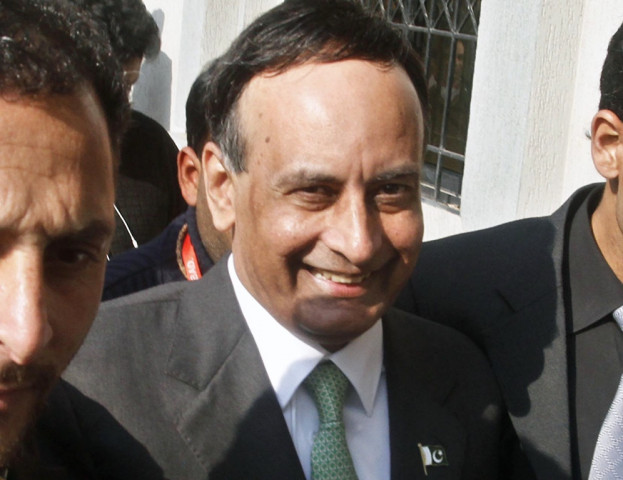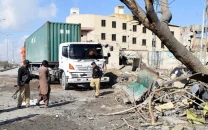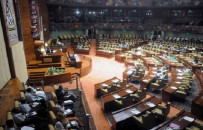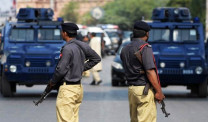Memogate: Haqqani links return to assurances of security, due process
Haqqani says he will not appear before the Supreme Court in person till threats against him are adequately addressed.

“I will not risk my life until the circumstances that have put my life in jeopardy have changed,” he wrote, adding “given the current mood and environment in the country, where individuals are being burned alive on unproved charges of blasphemy and ethnic, political and sectarian killings are going unnoticed, it is unreasonable to pressure me to return to the country to respond to political accusations based on the word of one foreigner.”
Describing the mainstream persecution and threats against his life, the Boston University Professor wrote that elements within the media had painted him “variously as a ‘traitor’, ‘Pakistan’s Benedict Arnold’, and ‘disloyal to the Pakistani state,’” insisting that these were extreme characterisations by people who disagreed with him politically and had ‘jumped the gun’ to declare the former ambassador guilty of authoring an unsigned memo.
“Imran Khan, the Chairman of Pakistan Tehreek-i-Insaf (PTI), who also is currently leading the ‘Adlia bachao tehrik’ (Save the Judiciary Campaign) and claims to speak for Pakistan’s establishment has publicly declared me a traitor,” Haqqani wrote. “Another politician close to the establishment and one who also served as a Minister in the previous government headed by the then army chief General Pervez Musharraf, Shaikh Rashid Ahmed, has gone on national television to call me “Ghaddar ibne Ghaddar” (traitor son of traitors) without being rebuked by any judicial or judicious authority.”
He said the public outbursts against him in Pakistan have contributed to an increasingly hostile environ for Haqqani translating into threats from extremist elements.
“Both Khan and Ahmed have shared the public stage with groups and leaders described internationally as terrorists. Their pronouncements are, therefore, to be seen as potential incitement to their supporters in Jihadist terrorist organisations to eliminate me as a voice for a liberal and tolerant Pakistan.”
Further elaborating on the threats on his life from several quarters, Haqqani wrote “these include the operatives of the several intelligence services with which my sole accuser Mansoor Ijaz claims to have relations; extremists and terrorists who claim to have monopoly over being true Muslims and Pakistanis; some vigilante or angry man provoked by the hostile comments of politicians, commentators and Commission members questioning my loyalty to Pakistan; and members of the permanent state apparatus who may have played a role in my ouster from the office of ambassador.”
Haqqani added that during his stay in Pakistan from November 18, 2011 to January 31, 2012, he was able to stay in the “relatively safer precincts of the Presidency and the Prime Minister’s House” owing to his personal and political ties with the President and Prime Minister. But, he added that today even such high profile relations offer no more comfort. “Subsequent events have showed that there is no assurance of safety of tenure of incumbents of those high, elected, constitutional offices. It is unreasonable to expect me to depend for my personal security on personal relations with holders of high constitutional offices whose own positions are constantly under threat,” he declared, before pointing to the case of former Punjab Governor Salmaan Taseer who was shot dead by his own state provided security guard.
“Who can assure me that there is no Mumtaz Qadri waiting for me and no Justice Khawaja Sharif lurking in the wings to defend and protect him after I have been killed?” Haqqani asked.
He also hinted at threats from elements within the powerful State apparatus. “The manner in which the then DG ISI took it upon himself to act in implicating me in the origins of the memo gives me a strong reason not to trust the current state machinery in my protection. I will need extra assurances and manifestations thereof before I can put my trust in being protected by those who deem themselves super-patriots and the only guardians of Pakistan or its ideology.”
Haqqani concluded that the “only situation in which I envisage myself returning to the country is after I have been afforded an opportunity to defend myself with due process of law and lift the poisoned atmosphere created against me.” He said, “I have an obligation to my family and children. I cannot and will not take a risk with my life and personal security under the present circumstances.”
The former ambassador also said that “the failure of the state including the superior judiciary, in protecting the lives of those killed and dumped in Balochistan do to not inspire much confidence about its ability to ensure my security upon return to Pakistan.”
Additionally, Haqqani claimed, the commission too had contributed towards creating a hostile environment against him by adopting a line of their questioning and presenting a guilty verdict. “The highly incendiary language used by the Commission in its partisan report has increased the threats to my safety and security in case of returning to Pakistan.”
On the Supreme Court’s four day notice to return condition for lifting a travel ban on Haqqani, the former ambassador argued that this was no longer applicable because “the Commission’s decision to facilitate Mansoor Ijaz by recording his statement by video conference lacked transparency as it denied me the opportunity to request the same before the Supreme Court, leading me to give the Supreme Court an assurance based on lack of knowledge of the Commission’s intentions.”
He maintained that he was still willing to appear before the nine-member bench via video conference.
“I appeared in person before the Commission on January 9 and was represented in its proceedings by counsel that I engaged at my cost. Instead of trying to find facts, the Commission waited until February 23, 2012 for Ijaz’s statement from London by video conference,” he pointed out.
Haqqani concluded that the “only situation in which I envisage myself returning to the country is after I have been afforded an opportunity to defend myself with due process of law and lift the poisoned atmosphere created against me.” He added, “I have an obligation to my family and children. I cannot and will not take a risk with my life and personal security under the present circumstances.”



















COMMENTS
Comments are moderated and generally will be posted if they are on-topic and not abusive.
For more information, please see our Comments FAQ